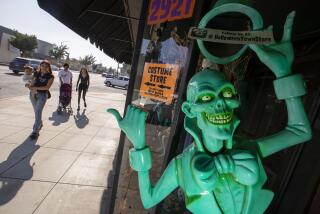BOOK REVIEW / HISTORY : LEAVING BIRMINGHAM <i> by Paul Hemphill</i> , Viking, $23.50, 351 pages : Recalling the Two Faces of Birmingham
- Share via
In an era prone to pronounce other people and cultures “good” or “evil” after merely glancing at them from afar, Paul Hemphill is a writer to cherish.
While his novels and nonfiction have always managed to look candidly and probingly at his subjects’ shortcomings, he has never failed to discover in them at least some love and vulnerability.
In his loosely autobiographical 1989 novel, “King of the Road,” for instance, Hemphill painted a loving (though not always forgiving) portrait of his hard-drinking, hard-driving father. Now, in this history-cum-memoir, Hemphill attempts to do much the same thing with his native town of Birmingham, Ala.
Hemphill’s is no small ambition, for if evil had a favorite haunt during the civil rights movement of the 1950s and ‘60s, it was Birmingham.
Birmingham was where thugs leaped onto an auditorium stage to pummel black singer Nat (King) Cole, where the Ku Klux Klan randomly kidnaped, emasculated and left to die a man guilty only of having black skin, where Martin Luther King Jr. was arrested as an “outside agitator” and, most disturbingly, where a black church was dynamited, killing four young girls as they were slipping into their choir robes one Sunday morning in September, 1963.
As Hemphill acknowledges, “Most of us regarded (the city) with the same morbid fascination that causes us to slow down and gawk at a bloody wreck on the highway.”
Hemphill’s training as a feature writer--he came of age crafting vivid stories of hookers and politicians, pilots and priests for Southern newspapers--clearly hasn’t left him up to his grand task of depicting an entire city’s evolution from the ‘40s to the ‘90s.
Skimping on political or cultural analysis, he often tries to tie loose ends together with glib observations, as when he concludes this book with the story of a black family that had “found peace” in Birmingham, “happily taking its rightful place in the world.”
Hemphill’s upbeat summation fails to ring true, for he never reconciles it with earlier, more pessimistic observations.
Birmingham pastor John Porter, for instance, speculates that African-Americans now control Birmingham’s city council only because whites have given up on the town: “Once it becomes difficult to run a city, when the city is already dead or dying, that’s when we become mayor.”
Still, in what is no small triumph, Hemphill’s history does manage to offer the best explanation to date of the frustrations that led Birmingham to “sulk like a volcano ready to erupt at the slightest provocation.”
After the South lost the Civil War, Hemphill writes, Northern investors began roaming the land, snatching up parcels that had been worth $50 for as little as $3.
The town still had hope that it could recover by revitalizing its steel industry, but that too was taken over by the Northerners, who imposed tariffs on Birmingham steel to protect their more important investments.
Steel industrialists also stoked financial fears, cooking their accounting books so miners owed their souls to the company store and rousing racial animosities. “You don’t want to work?” disgruntled whites were told. “I know a thousand niggers that do.”
Throughout “Leaving Birmingham,” Hemphill avoids a weakness common to the genre: a tendency to glorify the superhuman strength of blacks and to conjure up supernatural evil in whites.
Like novelist Ralph Ellison and lawyer J.L. Chestnut Jr. (whose 1990 memoir, “Black in Selma,” is an unrecognized classic), Hemphill gains our interest and sympathy in part by showing that he is as fallible as the people he is portraying.
He admits that as a kid he wasn’t disturbed by the oppression at Birmingham’s main steel plant; rather, he was thrilled by the showers of sparks it would send shooting into the night.
And that as a young adult he wasn’t riveted by radio reports of Freedom Rider attacks; rather, he was annoyed that he couldn’t find Perry Como or Hank Williams on the dial.
Perhaps most self-effacing is his admission that for all his attempts to write honestly and forgivingly about his home town, he hasn’t been able to craft a piece about Birmingham that his conservative parents would accept.
When he told his dad that he would be profiling the city in an upcoming Sunday New York Times Magazine feature, his father sought out a flight attendant to bring back the first copies from New York.
His father was at the gate when the plane arrived and he raced back home with them. By noon, however, there was a bonfire blazing in the back yard of Hemphill’s childhood home. And on Monday, with his sister helping them out, his parents cruised all of the hotels and newsstands in Birmingham where the magazine might be arriving and then added those too to the flames.
More to Read
Sign up for our Book Club newsletter
Get the latest news, events and more from the Los Angeles Times Book Club, and help us get L.A. reading and talking.
You may occasionally receive promotional content from the Los Angeles Times.







